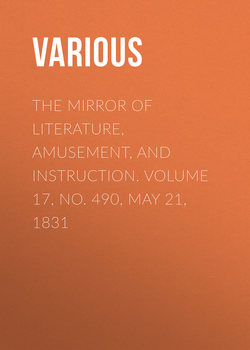The Mirror of Literature, Amusement, and Instruction. Volume 17, No. 490, May 21, 1831

Реклама. ООО «ЛитРес», ИНН: 7719571260.
Оглавление
Various. The Mirror of Literature, Amusement, and Instruction. Volume 17, No. 490, May 21, 1831
PARLIAMENT
SIMPLE AMBITION
RANSOMS
THE EQUESTRIAN STATUE OF PETER THE GREAT
SONNET TO HOPE
THE SKETCH-BOOK
A SCENE FROM LIFE
SELECT BIOGRAPHY
PAGANINI, THE VIOLINIST
THE NATURALIST
THE SUSTILLO
DESCRIPTION OF A BEAUTIFUL TREE
SPIRIT OF THE PUBLIC JOURNALS
CIGAR-SMOKING
THE NEW COINAGE
SPIRIT OF DISCOVERY
HYDROSTATICS AND PNEUMATICS
THE GATHERER
SCRAPS
ELECTIONEERING ADVICE
THE NATIONAL DEBT
PLURALITIES
COMPUNCTIOUS VISITINGS
IMPROMPTU ON THE BURIAL OF SHUTER, THE ACTOR
Отрывок из книги
The following particulars, which have been gleaned from several sources, relating to the British Parliament, may be acceptable at the present time, when the English people are in hopes of a renovation of that Constitution which has been, and will still continue to be, the admiration of the civilized world:—The word Parliament was first used in 1265; and the Commons were admitted at this time, though not regularly represented. The parliament called at Shrewsbury, in 1283, by Edward I., was the first to which cities and towns were summoned to send representatives. It was also the first that granted aids towards the national defence of the three denominations of knights, citizens, and burgesses, as well as by the lords spiritual and temporal. In this parliament the representatives sat in a separate chamber from the barons and knights. The Commons consisted of two knights for each county, two representatives for the city of London, and two for each of the following twenty towns only:—
Winchester, Newcastle-upon-Tyne, York, Bristol, Exeter, Lincoln, Canterbury, Carlisle, Norwich, Northampton, Nottingham, Scarborough, Grimsby, Lynn, Colchester, Yarmouth, Hereford, Chester, Shrewsbury, Worcester.
.....
Writs for the election of members to serve in the House of Commons are issued under different authorities upon a general election, and upon vacancies of particular seats during the continuance of a parliament. In the former case, the Lord Chancellor of Great Britain, pursuant to the order in council, causes the writs of elections to be issued for all places in England and Scotland to which such writs are usually sent. By the Articles and Act of Union with Ireland, the Lord Chancellor then, pursuant to the said orders, &c., causes writs to be issued and directed by the Clerk of the Crown in Ireland to the several counties, and such counties of cities and towns as send members to the united parliament.
It is generally supposed that the circumstance of bishops, or other ecclesiastics having seats in the legislature, is peculiar to England. This is a mistake;—it was characteristic of the Scottish constitution for centuries previous to their connexion with England: so far back, indeed, if not much farther, as the twelfth century. It is stated, in ancient documents connected with the history of the county of Elgin, the authenticity of which cannot be doubted, that the Abbey of Kinloss was founded by David I., in January, 1150, and that the abbot was mitred, and had a seat in parliament.
.....